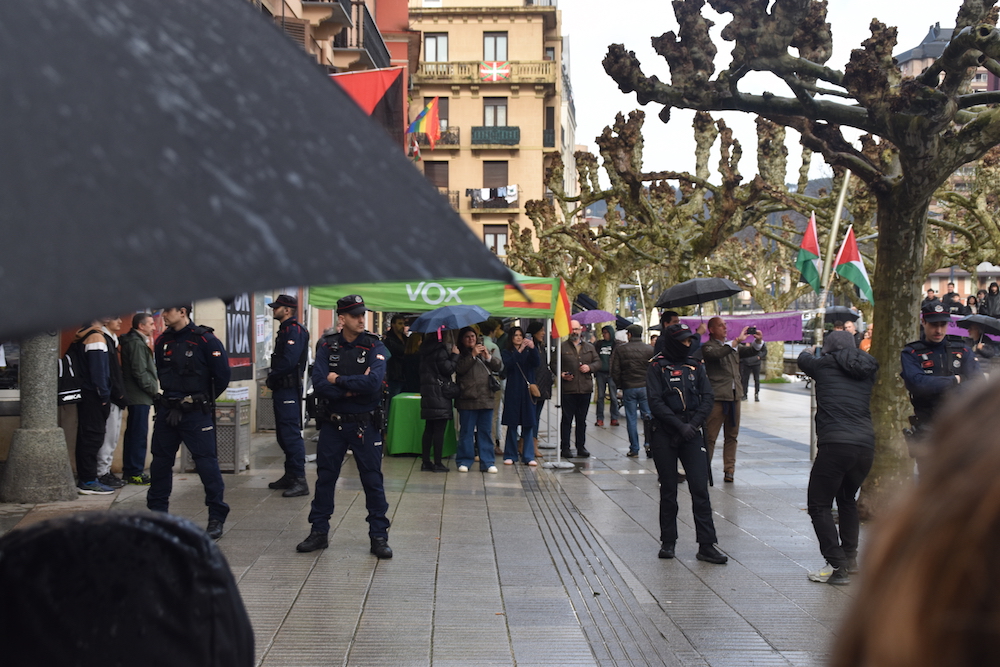Derivative century after century
- An exciting song in Basque brings us the imprint of an old European myth. The members of Euritan Blai performed the song of the Boiled Jew or Jüdifra and adorned it with music, pronouncing the coplas in Suletino. The truth is that the history of the wandering Jew goes back to the Middle Ages: he who travels the world, since he has lost his death, cannot lose his life.
In the sand, man erodes in the course of the earth, on the cliff, isolated, harassed, excited. The stories developed in the different languages add that it is the culprit of the bitter fate:
Is there anything in the world that can be compared to a
wandering Jew?
I don’t think there is any miserable
that can approach his fate…
In the Swedish version it is called jüdifer to the errabundo, which the poet adds: it is the cause: thus stormentatürik. Twenty-eight coplas are counted on the paper in which the song is thrown into the laboratory, but they are much less sung.
Those who crossed the character, who was a jirlachon and a jirlachon, were above all astonished at how long his beard was. It was rooted in the mold of the ordinary worker, with the window board, as specified in the Latvian. It was a lump behind his back and revealed to the bourgeoisies that invited him to the inn that had just turned 1,800 years old:
Eighteen centuries I spent
Picar in heath, oh, sure…
Standing up the forest, he gathered more biographical details in the Tebetan bars of Lapurdi or Zuberoa, in different dialects:
I have been called in
the people of Israel,
founded in the city of Jerusalem.
The Lord is a wandering Jew.
Literature bears witness to the mythology of the wandering Jew. In 1228 the Benedictine priest Paris tells of the visit of the Jew Kartafilius to the monastery of San Albans. Legend spread across Europe beyond the 16th century and writers – especially in German since 1602 – baptized Ahaswerus. The derivative would be understood as a curse, because the Jews were accused of having participated in the crucifixion of Jesus. Christians did not forgive them and we know how and where the insults, insults and infamous injuries would end.
My great evil, I will tell the truth,
I mistreated the beloved Jesus;
I have to be in mercy. I
had to miss cruelty…
Sin is designated in the verses: Jesus asked a Jewish shoemaker on the path of the Gulf Calvary, who could rest the crucifix by the door. Ahaswerus shook his head in a sign of refusal, barking with the dogs of the Roman Pontius Pilate.
Go ahead, damn it!
He immediately received the punishment of Jesus’ lips:
Jesus said to him in the oak For at
least a thousand years, you would walk in the world…
The bourgeois, interested in the song, gave Jesus the right:
No doubt you have deserved it well, when the
Lord had put you in paws on the street…
Let us not forget that from the seventeenth century, when the era of the Protestants and sorcerers was extinguished, as we know with force, the most bitter Christianity of our peoples spread, to the point that with one point they managed it more brutally by Jansenism. The Jüdifra ballad shows that in the days when he returned to the Basque country, the Basque was already deeply believer.
The Jews were located in special neighborhoods or aljibes closed in the Basque Country and besieged by Europe in areas that were given the name of Venetian ghetto. When in 1492 the Catholic Monarchs took refuge in Spain and Portugal, they managed to take refuge in Navarre in exchange for paying the tribute: Tudela, Estella, Pamplona, North Labastida, Bidaxune and Baiona. Here too the diaspora referred to by the song of the wandering Jew was rooted.
They brought to Baiona the methods for decorating chocolate. They lived in harsh conditions: throughout the night, the wooden bridge of the Holy Spirit was to be blocked to Maubec because they were forbidden to stay in the bourgeois city. You still see the fingers of the Jewish presence in Baiona: In 1836 the synagogue was built, the mikve of the ritual baths, a white and blue kip lost by someone who can gather the Israeli cemetery on the Santa Cruz route and the ground.
Baiona's Jewish culture and faith is based on Portuguese piety. It retains the old Torah, in addition to the traditional songs of the Sephardians heard here and there. Perhaps most of them spoke of the Ladino language, in a linguistic mixture between the Hebrew and the Spanish sound.
In the Northern Basque Country, the series of Coplas of the wandering Jew met: Azkue in Orabar (Orgrip ala?) He looked at them first, and then he looked at them in Muger and Hazparne. Jean Barbier, Dassance, known for the pseudonym of Nehor on the pages of the magazine Ns Herria Uztaritze, and Aita Donostia interested them. In 1927, he collected the Sulatino variant of a Bederakatz from Atharratze, which the members of the Euritan Blai group dedicated with music:
My name, Isak Lakere Düzü,
the hometown of
Jerusalem, has
been pronounced by the
Great People and pronounced by the Lord Jesus:
And I, the son
of Hanko, the
ever-evil, the unparalleled Mündian.
In the verses in Sulatino, it's called Isak Lakere that behaves in the derivative. It was not necessarily between Barkoxe, Maule and Larraine, because in the song the Austrian city of Vienna appears, but then, as the swollen Almanacs of popular wisdom read, some Bertsolari would have been inspired by the sad and melancholic history.
He gave me a
drink. He was beaten twice.
Oh! Seeing the
will that
Zie knew
of Nula Arrafüsa, I couldn't say anything.
This is
Doloria or Confusionia.
The shadow of a wandering Jew, who might tear the face of the earth, stirred up the brains of his generations, imagining at the same time a curse and the freedom to move freely through any path, free, poor and almost naked.
You don't hear the song of the wandering Jew anymore. There were no serious feelings of anti-Semitism, but there were elements of centuries of hate speech that would lead six million Jews to the death camps of the Nazis, as in the film Süss Judua, produced in Balbesberg in 1940. Let us not forget either that the Basques participated in this massacre by wrangling as a serum the passionate articles written by the priests of the Semanario Eskualduna against the Jews and the Framazons. In the years after the Second World War, Jon Miranda would still throw stones at the Jews and Gabriel Aresti coveted his fate in poetry Apuremos the 1963 string:
Not sure:
The Jew walks
much better around the world.
We are far from the mercy of past centuries: the wandering Jew, every hundred years, when he passed through the peoples, excited the gaze of the crowds, to the point of creating coplas or bringing the Basque to those who were in other languages. However, in this sense and about to become anti-Zionists in support of the Palestinian struggle, in the 1970s there were two writers who wore the Israeli model in the corner of the hull: on the one hand, former Aldusta businessman Beñat Laxague believed that the organization of the desertized interior of Euskal Herria was going to motivate the development in Basque of Ehyerkana Tui.
The song of the wandering Jew or Jüdefer shows us, if necessary, that the Basques have never lived outside the cultural waves of Europe and makes it clear to us what our relationship was with the Jewish world throughout history.
Oh, this ailment!
Otherwise, I've taken a big storm ...
Lau mila karaktere ditut kontatu behar dudana kontatzeko. Esan behar ditut gauzak argi, zehatz, soil, eta ahalko banu polit, elegante, egoki. Baga, biga, higa. Milimetrikoki neurtu beharra dut, erregelaz markatu agitazioa non amaitzen den eta propaganda non hasi. Literarioki,... [+]
Euskorpora elkartearen eta Euskorpus proiektuaren abiatzeak hautsak harrotu ditu. Pello Otxandiano EH Bilduko Eusko Legebiltzarreko oposizio buruak Euskorpusena akatsa dela uste du, "ezjakintasuna edo estrategia klientelarra". EH Bilduk galdera sorta egin du... [+]
LGTBIQ+ banderaren itzalpean eta mezu eta doinu antifaxistez inguratuta jarri du karpa Voxek.
Diario de Noticias de Álava (DNA) egunkariko langileak sinadura greban daude, eta aspaldi ari dira beren lan baldintza “miserableak” eta horiek kazetaritzaren kalitatean duen eragina salatzen. 2013tik soldatak izoztuta dituzte, eta ordutik erosahalmenaren %30... [+]
Emakume bakoitzaren errelatotik abiatuta, lurrari eta elikadurari buruzko jakituria kolektibizatu eta sukaldeko iruditegia irauli nahi ditu Ziminttere proiektuak, mahai baten bueltan, sukaldean bertan eta elikagaiak eskutan darabiltzaten bitartean.
Ibon galdezka etorri zait Bizibaratzea.eus webguneko kontsultategira. Uda aurre horretan artoa (Zea mays) eta baba gorria (Phaseolus vulgaris) erein nahi ditu. “Arto” hitza grekotik dator eta oinarrizko jakia esan nahi du, artoa = ogia; arto edo panizo edo mileka... [+]
Nekazal eremu lehor baten erdian ageri da putzua. Txikia da tamainaz, eta ez oso sakona. Egunak dira euririk egiten ez duela, baina oasi txiki honek oraindik ere aurretik bildutako urari eusten dio. Gauak eremua irentsi du eta isiltasunaren erdian kantu bakarti bat entzun da... [+]
Zuhaitza esnatzear dago, kimuak ageri dira adarretan. Gutxi falta da loraldirako, laster aro berria hasiko du, indarberrituta.
Okzitaniako Tolosako elkartea da aipatu kolektiboa eta Frantziako Gobernuak dekretuz desegin zuen 2022an. Orain Estatu Kontseilua gobernuaren erabakia egokia dela berretsi du.
Sare Herritarrak antolatuta, pasa den urtarrilaren 11n Bilboko kaleak bete zituen manifestazio jendetsuaren ondoren, berriz sortu da eztabaida, euskal presoei salbuespen legeriarik aplikatzen ote zaion. Gure iritzia azaltzen saiatuko gara.
Espetxe politikan aldaketa nabarmena... [+]



















